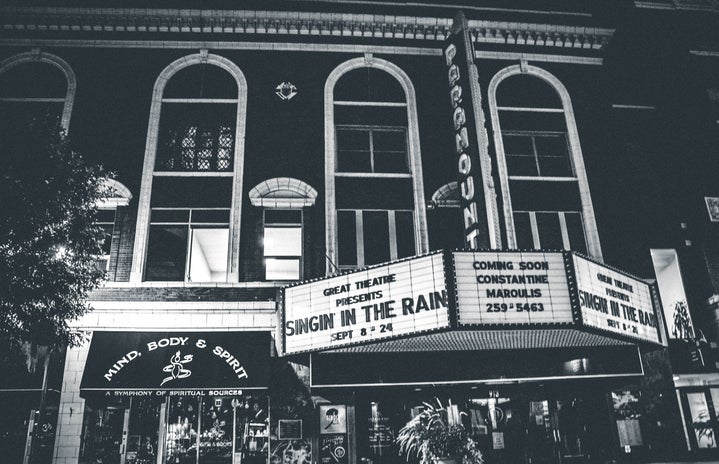Recently, I was lucky enough to see the one-woman stage adaptation of The Picture of Dorian Gray, starring Sarah Snook, at the Theatre Royal Haymarket. When I had heard about this about a year ago, I was in the midst of my Succession obsession and obviously madly in love with Sarah Snook. I was desperate to go and thankfully it fulfilled all my expectations and more.
The Picture of Dorian Gray, for those who don’t know, is a 19th century novel by the infamous Oscar Wilde. It is a philosophical exploration of morality and sin, with the central concept being that a portrait holds the soul of a person. And whilst the portrait can change and take on the burden of sin, the subject of it remains exactly as it was the day the portrait was finished. This means the narrative is concerned with youth and beauty and how much significance we as a society place in these things. In this way, Wilde’s words are just as relevant today as it was when it was written. Therefore, I think this particular portrayal, adapted and directed by Kip Williams, expertly encapsulates this feeling in the modern day through the acting as well as the innovative experimentation with staging in a way which makes me think that Wilde would have revelled in this adaptation of perhaps his best-known work.
Firstly, the goddess that is Sarah Snook. The entire play hinges on her ability to portray countless characters and stay in time with the pre-recorded elements of the play. There are many meta moments in this, and I think the incorporation of Snook narrating and changing characters on stage is genius in allowing the audience to be invited to completely suspend their disbelief. A relationship between the actor and the audience has been created and it is all in service of the story. Snook’s ability to enrapture an entire theatre through her facial expressions alone was astounding and we all left the theatre both amazed and exhausted after witnessing the acting gymnastics Snook was achieving.
Furthermore, as I was contemplating this play, I was thinking of how one person playing all the roles impacts our understanding of certain themes. For example, one of the most prevalent ideas is selfishness and in today’s world we would perhaps label this as narcissism. Dorian Gray believes he can be as immoral as he wants because it will never show, he will always remain beautiful. I think this narcissistic quality is emphasised through one actress playing every part, everyone in some way or another is a mirror to Dorian Gray, he remains at the centre of every aspect of this adaptation.
Apart from the incredible performance, I think viewers come away from this play thinking about the way it was actually executed. For those who don’t know, this play uses lots of technology within the performance. There are multiple screens which are playing both pre-recorded videos of Snook as another character and then whoever Snook is playing on the stage will then act alongside herself (mind-blowing stuff). In one scene, there is a dinner party and Snook is acting with about 5 other characters, all of which have been pre-recorded. As a member of the audience you simply forget that she has also played these characters. Snook truly is a master of delving into a character and disappearing.
There is also the use of an iPhone throughout the play which allows them to use filters which distort her face. This is often used to portray how the portrait is changing or how we are perceiving a character at a certain time. However, about half way through it is quite clearly being used as a commentary on our fascination and constant use of filters. We will touch up a photo, perhaps make our eyes brighter and our cheeks thinner, all because of social pressures and vanity. We are no different to previous generations, where we link youth to beauty and desire, therefore demonising aging. We would rather alter and distort our appearance than confront reality. The grotesque nature of this is challenging for the audience, despite being hugely comedic, and is combined with 90s and 2000s pop music to further drive this point home. This adaptation excels when linking the past and present, whether that is through writing or through the practical staging.
I have noticed recently in theatre that there seems to be an increasing celebration and use of the technical, and traditionally known as, backstage crew. Early this year I went to see Guys and Dolls at the Bridge Theatre, which is sold as a sort of immersive experience if you get the standing tickets. This means you are shifted by some of the crew who are dressed as police for the moving stage to be in the correct place. In Dorian Gray, the crew are not among the audience, but they are integral to the performance. There are multiple camera operators filming Snook at all times, there are also crew who are responsible for changing her outfits and hair and to the move the set. It truly looks like an exhausting, yet extremely rewarding job.
I left in awe of every person who was involved in this masterpiece. From Sarah Snook, to the camera operators, to the director. This, perhaps ironically, truly felt like an ensemble cast, with each person at the peak of their game. The merging of filming technology and traditional theatre techniques is inspired, and I wonder if this is the future of theatre? Will we see more use of multi media performances taking full advantage of all the tools we have now. This adaptation of a Victorian novel felt as relevant as a show like Succession, demonstrating the value of adaptations when you have a fresh and unique vision.


